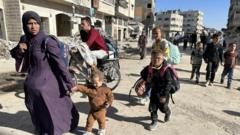The humanitarian crisis in northern Gaza deepens as the UN Relief and Works Agency for Palestine Refugees in the Near East (UNRWA) raises alarms about Israel's continued restrictions on aid delivery to the region. UNRWA head Philippe Lazzarini emphasized the dire state of hospitals and shelters, stating that critical supplies such as food and medicine have not reached those in dire need. He detailed that hospitals have been left without power and care for injured individuals, while overcrowding in shelters has forced displaced families into unsanitary conditions, including living in restrooms.
The Israeli military has been escalating its offensive in northern Gaza, claiming to target Hamas militants who are purportedly regrouping in the area. Testimonies from local residents and medical personnel indicate that Israeli forces have besieged hospitals and makeshift shelters. In a concerning incident, medics reported troops stormed a school, detaining several men and setting the facility ablaze. Amidst these military actions, reports from Palestinian sources indicate a tragic toll on civilians, where at least ten individuals were killed from Israeli artillery strikes on a displaced persons camp.
While the Israeli military claims to be facilitating evacuations and maintaining hospital operations, discontent grows over their methods. Israeli authorities reported passing 41 aid trucks and six fuel tankers into northern Gaza recently, alongside a UNICEF mission delivering polio vaccines. Yet according to the UN, no substantial aid had been allowed since the onset of military activities in early October, with only a trickle of aid approved following diplomatic pressure from the United States.
The UN's Office for the Coordination of Humanitarian Affairs (OCHA) conveyed ongoing requests to access specific areas within Jabalia, which have consistently been denied. A resident's heartfelt video appeal highlighted desperate conditions where individuals are trapped under rubble following airstrikes, pleading for rescue while suffering immense pain and isolation.
International representatives, including those from the International Committee of the Red Cross (ICRC), voiced grave concerns regarding the conditions faced by around 400,000 residents in northern Gaza. They described a situation where infrastructure is collapsing under the combined weight of ongoing military conflict and overwhelming medical needs. Frequent evacuations have led to fragmented communities, leaving vulnerable populations—such as the elderly and disabled—at risk with dwindling food and water supplies.
Hospitals reportedly struggle to cope with an influx of patients, lacking fundamental necessities including power and medical supplies. As the violence continues, calls for international assistance and an urgent ceasefire grow louder, with the global community advocating for immediate humanitarian relief efforts to address the catastrophic impact of the conflict, especially on civilians.


















